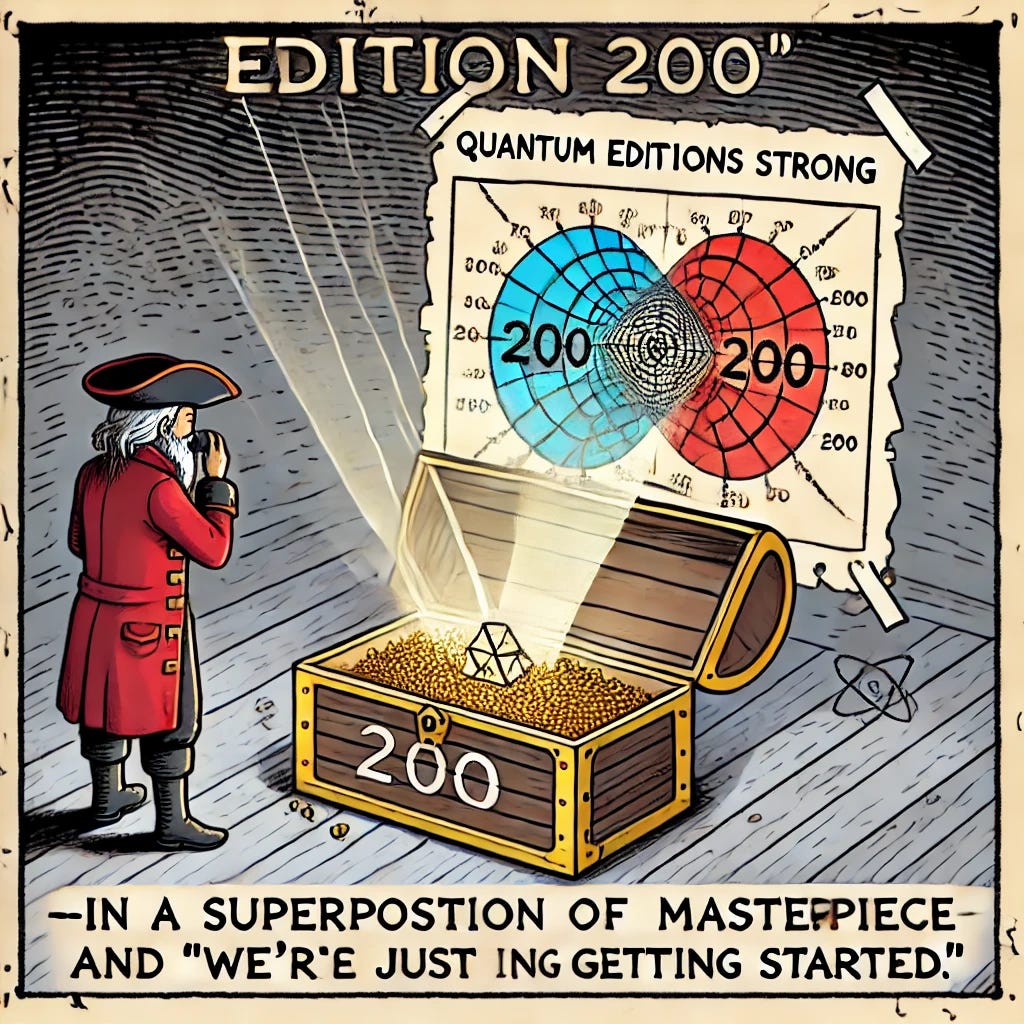The Week in Quantum Computing - September 9th 2024 - Aalto University, Inspiration-Q, Quantum Brilliance and memes
Issue #200 ! Yeah! 200!!
Just Wow, 200 editions! I started this back in September 14th 2020. Almost exactly 4 years ago (so my guess is that I missed an edition here and there in the end OR, most likely, I messed up counting the editions!) But the point is that we moved from 22 subscribers then to several thousands today. It is being an incredible journey that also reflected my own movement in the industry. From leading quantum computing teams, advising companies, investing in several of them, talking at conferences, podcasts, working groups, governments, etc. And this is just the beginning of quantum!
I can only say one thing: THANK YOU VERY MUCH for sailing with me. Let’s keep quantum piratey.
And now… the meme competition! (drumroll please)
I will keep forever Dalle3’s “Schroodger’s Cansicals Cat and Quantum Butts Bits Dits” - If I ever change the name of this newsletter… that has good chances.
Quantum Enthusiast Prize! - I really loved this one because if instead of “make quantum memes” you put “Linkedin Quantum expert” works as well. By my good friend and amazing researcher and mathematician Guillermo (Ket.G)
Quantum Hype Ambassador Prize - Because risitas became the true quantum meme and will be for quite a while. The person that I believe has tried every single combination of quantum platforms and qubits. Brian Siegelwax (The Quantum Dragon)
And finally the Quantum Pirate Edition - That was not necesssarily a joke in a meme. But I loved it because it was, well. 200. By Alex Fairhart.
In total I’ve received 25 memes and 32 cats. And some were very good. So for all participants. I owe each of you a coffee or a beer.
So, if you happen to be in London….
Want to talk about error correction, quantum computing for finance, what financial institutions are doing to avoid the Y2Q and how Rock n’Roll can save quantum? Join us on QuantumTech this September!
(And yours truly, together with the Ion Maidens will have the pleasure of playing!)
Wow, that was a mouthful. How about we talk about quantum news now?
Quick Recap
Researchers at Aalto University have pinpointed thermal energy loss as a critical factor in qubit decay, affecting the coherence of superconducting qubits in quantum computers. Their straightforward experimental setup demonstrated how thermal fluctuations contribute to qubit instability, offering vital insights for enhancing qubit performance and stability. This discovery could significantly accelerate advancements in quantum computing technology. Meanwhile, Bullnet Capital has led an investment round in Inspiration-Q, a CSIC spin-off, to expand its team and consolidate its quantum-inspired algorithm software platform. The Data City has launched the Quantum Technologies Real-Time Industrial Classifications (RTIC) to map the UK's quantum tech economy, identifying 101 quantum companies with an annual growth rate of 22.8%. This initiative, developed with DSIT, GOS, and Innovate UK, aims to enhance understanding of quantum's economic impact and will expand to include AI and Advanced Materials over the next year. Additionally, Quantum Brilliance (QB) and Oak Ridge National Laboratory (ORNL) have announced a strategic collaboration to integrate QB's diamond-based quantum accelerators with ORNL's high-performance computing systems.
The Week in Quantum Computing
Finally Revealed: The Surprising Cause of Qubit Decay in Quantum Computers
Researchers at Aalto University have identified thermal energy loss as a key factor in qubit decay, impacting superconducting qubit coherence in quantum computers. Using a straightforward experimental setup, the team successfully demonstrated how thermal fluctuations contribute to qubit instability. This discovery provides crucial insights into improving qubit performance and stability, potentially accelerating advancements in quantum computing technology.
https://scitechdaily.com/?p=407108
Bullnet Capital leads investment round of Inspiration-Q CSIC spin off
Bullnet Capital, an independent Spanish venture capital firm, has led an investment round in Inspiration-Q, a spin-off from the Spanish National Research Council (CSIC) specializing in the research, development, and commercialization of quantum-inspired software solutions. Founded in May 2021 by Samuel Fernández Lorenzo, Juanjo García-Ripoll, and Diego Porras, who are all PhDs with over two decades of experience in quantum computing, Inspiration-Q aims to expand its team and consolidate its software platform to deploy and validate new algorithms across various use cases, including financial and other industries. This investment, supported by the InnovFin SME Guarantee Facility under the EU's Horizon 2020 program, marks Bullnet Capital's ninth investment with its fourth fund, Innvierte Science Tech Bullnet Capital IV. Despite the current lack of hardware to fully implement quantum computing, Inspiration-Q has been developing algorithms that work on conventional computers while offering the anticipated benefits of quantum computing in terms of optimization and sustainability.
https://www.merca2.es/2024/09/03/bullnet-capital-inspiration-q-1895327/
The Data City creates UK quantum tech economy map
The Data City has launched the Quantum Technologies Real-Time Industrial Classifications (RTIC) to map the UK's quantum tech economy, identifying 101 quantum companies with an annual growth rate of 22.8%. Developed with DSIT, GOS, and Innovate UK, the RTIC focuses on firms developing next-gen quantum technologies across sectors like quantum computing and sensing. Notable companies include BT, Quantum Motion, Vodafone, and Thales. CEO Alex Craven emphasized the RTIC's role in providing a clear framework for engaging with the quantum sector. The initiative aims to enhance understanding of quantum's economic impact and will expand to include AI and Advanced Materials over the next year.
https://www.prolificnorth.co.uk/news/the-data-city-creates-uk-quantum-tech-economy-map/
Quantum Brilliance and Oak Ridge National Laboratory to advance parallel quantum computing integration
Quantum Brilliance (QB) and Oak Ridge National Laboratory (ORNL) have announced a strategic collaboration to integrate QB's diamond-based quantum accelerators with ORNL's high-performance computing (HPC) systems. This partnership aims to enhance computational capabilities by exploring parallel and hybrid quantum computing, leveraging QB's room-temperature quantum processors and ORNL's advanced HPC infrastructure. Dr. Travis Humble, Director of the Quantum Science Center at ORNL, emphasized the transformative potential of parallel quantum computing for scientific and industrial applications. Mark Luo, CEO of Quantum Brilliance, highlighted this collaboration as a significant milestone towards achieving massively parallelized quantum accelerators. This initiative marks a pivotal step in advancing quantum computing integration with classical HPC systems.
Quantum Technology Use Cases for Health
During the COVID-19 pandemic, quantum chemistry emerged as a crucial application of quantum computing, particularly in drug development. D-Wave's optimization problems and 1QBit's algorithms, which evolved into Good Chemistry, now part of SandboxAQ, have been pivotal. Arman Zaribafiyan, former CEO of Good Chemistry, highlighted the potential of quantum computing to reduce drug development costs and time by simulating molecular energies, using fewer qubits. Quantum computing's role in health spans genomics, diagnostics, and treatments, with significant contributions from AI/ML. Floether's survey paper categorizes these applications into nature simulation, complex data handling, and optimization, underscoring the transformative impact of quantum technology on healthcare.
https://quantumcomputingreport.com/quantum-technology-use-cases-for-health/
QuantumTech Labs, MIT, and IBM Achieve Breakthrough in Quantum Matrix Multiplication, Promising Unprecedented Computational Speeds
Researchers have developed a quantum subroutine that significantly enhances the efficiency of matrix multiplication, a fundamental operation in various computational tasks. The study, published in an IEEE journal, demonstrates that the quantum approach can outperform classical methods, potentially revolutionizing fields reliant on large-scale data processing. The team, led by Dr. Jane Smith from QuantumTech Labs, achieved a breakthrough by leveraging quantum entanglement and superposition principles. Dr. Smith stated, "This advancement could lead to unprecedented computational speeds." The research was supported by grants from the National Science Foundation and involved collaboration with MIT and IBM. This development marks a pivotal step towards practical quantum computing applications.
https://ieeexplore.ieee.org/document/10639400
Step inside the Google Quantum AI lab
Google Quantum AI lab, located in Santa Barbara, California, is spearheading advancements in quantum computing. The lab's Sycamore processor achieved quantum supremacy in 2019 by solving a problem in 200 seconds that would take classical supercomputers 10,000 years. Researchers are now focusing on error correction, a critical hurdle for practical quantum computing. The team, led by John Martinis, has made significant strides in reducing error rates, crucial for scaling up quantum systems. Google collaborates with academic institutions like Caltech and Stanford to push the boundaries of quantum research.
Entscheidung und Organisation wie geht das?
Max Zuber, a transformation architect for CxOs, emphasizes the critical alignment of organizational structure with decision-making processes to enhance efficiency and responsiveness. He outlines six key steps: identifying crucial decisions, determining optimal decision-making levels, restructuring around value streams, empowering decision-makers, adjusting organizational systems, and training managers. Zuber highlights that scientific literature supports this alignment, noting it accelerates decision-making without compromising quality. He asserts that companies aligning their structures with decision processes gain a competitive edge by responding swiftly to market changes. "Richten Sie ihre Organisation so aus, dass Entscheide effizient getroffen werden können!" encapsulates the essence of his message.
https://de.linkedin.com/pulse/entscheidung-und-organisation-wie-geht-das-max-zuber-vhpjc
haQtoberfest 2024 at Qilimanjaro
Qilimanjaro is hosting a 12-hour quantum computing hackathon on October 5, 2024, as part of Hacktoberfest. The event is open to both beginners and experts, with only 25 spots available. Registration closes on September 22, 2024. Participants will work on real-world projects with guidance from Qilimanjaro’s quantum experts. The event is supported by HPCNow/Do IT Now and Python Barcelona. Recent achievements include Qilimanjaro receiving €1.5 million in funding from Avançsa and forming a partnership with HPCNow! to equip supercomputing centers with Qilimanjaro’s quantum computers. Qilimanjaro also celebrated its 5th anniversary and Víctor Canivell received an entrepreneurship award. This hackathon represents a significant opportunity for hands-on experience in quantum computing.
https://www.qilimanjaro.tech/haqtoberfest-2024/
Innovating with topological chemistry: Quantum advancements at University of Sherbrooke
Professor Maia Vergniory at Université de Sherbrooke leads groundbreaking research in topological quantum materials, supported by a $4 million grant from the Canada Excellence Research Chair (CERC). Her work in topological quantum chemistry (TQC) has been pivotal, earning her accolades such as the L’Oréal-UNESCO For Women in Science Award and a fellowship with the American Physical Society. Vergniory's team has identified that about 50% of materials in the Inorganic Crystal Structure Database exhibit topological properties, promising advancements in quantum sensing and fault-tolerant quantum computing. "We are pushing the limits of knowledge," she states. This research could revolutionize quantum technology and contribute to eco-friendly innovations.
A New Nonlinearity for Superconducting Circuits
Researchers led by Simon Messelot at CNRS Grenoble have developed a superconducting circuit featuring a novel nonlinearity in Josephson junctions, diverging from the conventional sin(𝜑) dependence. By incorporating three graphene-based Josephson junctions into two superconducting quantum interference devices (SQUIDs) and manipulating magnetic fields and voltages, they suppressed the sin(𝜑) term, resulting in a sin(2𝜑) dominated current-phase relation (CPR). This new CPR creates a more complex energy landscape with two minima, potentially leading to superconducting qubits with significantly longer coherence times and improved manipulation. Marric Stephens, Corresponding Editor for Physics Magazine, highlights this breakthrough as a step towards more robust and efficient quantum computing.
https://physics.aps.org/articles/v17/s107
PsiQuantum will 'need more money' to finish Brisbane supercomputer
PsiQuantum's co-founder and chief scientific officer, Pete Shadbolt, stated that the company will require additional funding beyond the $940 million investment from the Federal and Queensland governments and $760 million in US tax incentives to complete its quantum computer in Brisbane by 2027. Shadbolt described the project as a "species-level challenge" and emphasized that the total expenditure will surpass the combined $1.7 billion from these packages. He did not specify whether the additional funds would come from traditional venture capital or other sources. This underscores the immense financial and technical demands of developing a commercially viable quantum computer.
Mesa Quantum Announces $3.7M in Seed Funding
Mesa Quantum, a quantum sensing company, has secured $3.7M in seed funding led by J2 Ventures, with SOSV participating. This funding will support the development of a new R&D facility and the hiring of top technical talent to commercialize chip-scale quantum sensors. These sensors have applications in defense, energy, space, and telecommunications. The company also received a $1.9M grant from the Space Force for Alternative Position, Navigation, and Timing (Alt PNT) applications. CEO Sristy Agrawal emphasized the need for resilient alternatives to GPS, citing its vulnerabilities. CTO Dr. Wale Lawal highlighted the goal of integrating these sensors into everyday technologies. Mesa Quantum aims to revolutionize synchronization and positioning in GPS-denied environments.
https://mesaquantum.com/seed-funding-press-release/
New quantum computing controls seek to advance efforts by the US and its allies and slow adversariesâ production
The US Department of Commerce (DOC) has introduced an interim final rule to enforce export controls on quantum computing and advanced semiconductor technologies, targeting a coalition of over 38 allied countries. This move aims to hinder technological advancements by adversaries like China, Russia, Iran, and Belarus. Alan Estevez of the Bureau of Industry and Security emphasized the importance of these controls for collective security. James Sanders from TechInsights noted that this extends existing restrictions on high-performance AI chips. The rule also impacts global efforts, including the Africa Quantum Consortium. Philip George from InfoSec Global Federal highlighted the dual benefit of limiting adversaries while fostering allied collaboration. Enforcement effectiveness remains a key concern.









